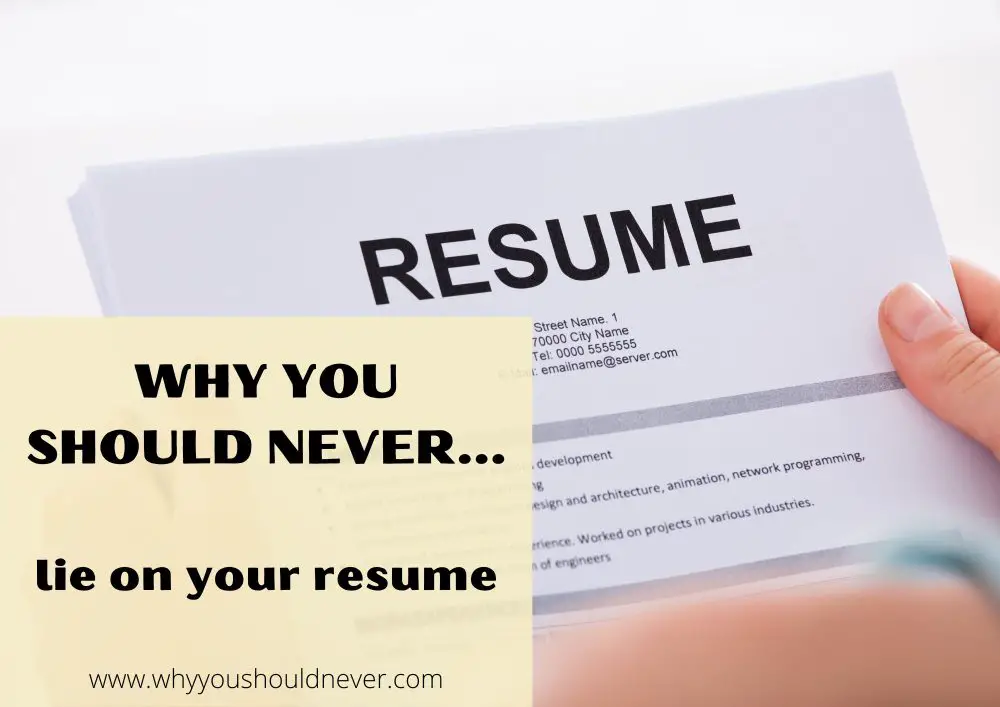![]()
Why You Should Never Lie On Your Resume
Have you ever been tempted to embellish on your resume? Maybe add a couple of skills or responsibilities that weren’t entirely accurate, but made you look better suited for the job? Or perhaps even go as far as claiming experience in areas where you have none?
We’ve probably all told our fair share of little white lies on our resumes. After all, competition for jobs can be stiff and it’s only natural to want to stand out from the crowd. I’d even go as far as saying that most employers expect some amount of padding on a candidate’s resume.
But should we really be doing this? And what are some of the downsides? Well, that’s what we’re here to explore.
8 reasons why you shouldn’t lie on your resume/CV
1. It’s dishonest
This one is pretty straightforward, but it needs to be said: lying on your resume is fundamentally deceitful. You’re misleading potential employers about who you are and what you bring to the table, which is ultimately going to damage their trust in you.
2. You might get caught
Lying on your resume isn’t just morally questionable; it also carries a significant risk of being exposed. Employers often do background checks or request references before hiring someone new – and if you’ve lied about your experience or qualifications, it’s more than likely that someone will uncover the truth.
3. You’re setting yourself up for failure
If you exaggerate what you’re capable of doing on your resume – even if just slightly – then once hired, there’s no way around actually performing those duties competently.
It doesn’t matter how good you are at faking it until you make it, eventually your lack of expertise will be exposed. You’ll find yourself struggling to keep up with the role you secured by lying on your resume.
4. You could cost the company money
To piggyback off the previous point, if you’ve lied about your skills or qualifications and are struggling to keep up with the job responsibilities once hired, it’s going to cost the employer money.
Perhaps they’ll have to invest in additional training for you or hire someone else entirely. Or maybe production will slow down because of mistakes made by an unqualified employee.
In any case, your dishonesty could end up having a significant impact on the company’s bottom line.
5. It’s disrespectful to other candidates
Think about all the hard-working, qualified people who are applying for the same job as you. Your resume deception means you might secure a role that someone else is better suited for. You’re thereby stealing that job from a deserving candidate.
Put simply, your dishonesty isn’t fair to those whose qualifications and skills speak honestly when compared against yours.
6. It’s not worth risking your professional reputation
Your resume is often the first impression a potential employer has of you – it’s essentially your personal marketing tool. So, if you lie about anything on there and someone finds out (which again, isn’t uncommon), then people’s faith in what you present going forward may be impacted.
In certain small, niche industries, word gets around quickly – especially when dishonest practices are discovered. Don’t expect everyone to forget about the fact that you lied on your resume when a similar opportunity arises again. This is particularly important in cases where careers are long, and networks stretch far.
7. It could negatively affect your mental health
The mantra ‘fake it till you make it’ is often perceived as a way to success – quickly gain skills through experience by pretending that you already have them.
However, when the reality sets in and people start calling out mistakes or inaccuracies because of your dishonesty, this can lead to embarrassment at best but could also cause prolonged anxiety.
Even if you’re doing a relatively decent job, you might also find yourself constantly feeling like an impostor, or worried that you’ll be found out for not actually possessing the skills and experience as per your resume. This is bound to affect you mentally.
8. You don’t need to lie
The truth is, your lies are usually unnecessary. You can very well stand out as a strong candidate by being honest and highlighting the relevant skills you do have that make you the best fit for the job.
Final word
To lie or not to lie, that is the question. However, it shouldn’t be a difficult one to answer now that you know all of the downsides associated with lying on your resume.
In essence, honesty pays off in both short and long-term career prospects, as being honest about what we can or cannot do shapes our job search into areas where we’re more qualified, thus saving time and reducing anxiety during interviews.
For those who wish to climb the ladder quickly through flashy resumes? Your dishonesty will probably catch up with you eventually, causing irreparable damage to your career.
Instead of trying to trick hiring managers or boost your self-esteem by lying on a job application, take stock and evaluate what experience you really have. Honesty is always the best policy!
